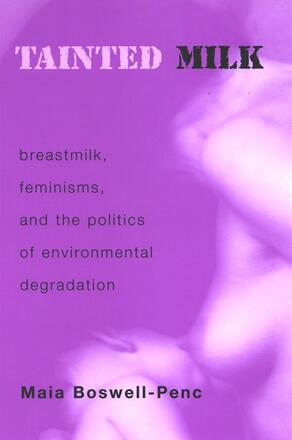ACKNOWLEDGMENTS
INTRODUCTION
Advocating for Breastfeeding: An Uphill Battle
A New Chapter with Familiar Patterns: Biomonitoring
Infant Feeding under Wraps Breastmilk’s Significance Environmental Toxicity Laying Out the Players
CHAPTER 1. THE EVOLVING NARRATIVE OF INFANT FOOD CONTAMINATION:HISTORICAL VIGNETTES
Part I: Wet Nursing Contamination Narratives: A Series of Supremacist Gestures Defining Terms
Addressing the (Colonizing) Dangers of Overgeneralizations
Wet-Nursing and Semen-Curdled Milk: Assessing the Myth of the Constitution Too Delicate to Suckle
Classism, Sexism, Ageism, and Lookism: Assessing Some Trends
The “Threat of the Dangerous Stranger”: Wet-Nursing in Select Mid-nineteenth-Century American Contexts
Human Milk Banking
White Supremacy and the Colonization of Black Women’s Bodies
Part II: Mathematical Formulas
The Advent of Scientific Infant Food and the Era of “Scientific Motherhood”
The Growing Impact of Advertising
Medicine and Markets
Colonization and the Search for New Markets:Exporting Infant Food as the More “Civilized” Choice
Breastfeeding and Population Debates
Debates Around the Possibility of HIV Transmission Through Breastmilk:A New Chapter or an Old Story?
The True Unborn Victims of Violence
CHAPTER 2. TOXIC DISCLOSURE: THE GROWING AWARENESS OF ENVIRONMENTALLY CONTAMINATED BREASTMILK IN THE CONTEXT OF MUCH-NEEDED BREASTFEEDING ADVOCACY
Rachel Carson’s Legacy
The Impact of Changing Rates of Breastfeeding in the United States on Interest in Environmental Pollutants in Breastmilk
Burgeoning Environmentalist Attention and Pulling Back Environmentalists’ Reluctance
Children’s Health Campaigns: The Power of the Internet
Impacts of the Breastfeeding Advocacy
Community Developments in Related Campaigns: Movements to Curb Formula Advertising and Use and to Protect Infant Health
Breastfeeding and Environmental Advocates: Friends or Foes?
The Role of the Press in Disseminating Stories of Breastmilk Toxicity
The Press on Toxic Fish Developments in Related Campaigns: The Environmental Justice Movement
The Sensitive and Unusual Nature of Breastmilk on a Policy Level and as a Fluid Vital to Life
CHAPTER 3. BREAST FETISHIZATION, BREAST CANCER, AND BREAST AUGMENTATION: THE CURIOUS OMISSIONS OF BREASTFEEDING AND BREASTMILK CONTAMINATION AS SIGNIFICANT FEMINIST ISSUES
A Lack of Feminist Attention
Feminist Silence on Infant Feeding: From Preoccupation with the Sexual Division of Labor to Fights for Reproductive Freedoms
Structural Impediments
Results of the Lack of Feminist Attention to Infant Feeding
Feminist Attention to Infant Feeding: “The Scientific” versus “the Political”?
Feminists Critiquing (and Embracing) Science
Who’s Doing the Feeding? Racism, Classism, and Colonization in Childcare
Work Immigrant Women Doing Childcare(In)Attention among Feminists to the Environmental Contamination of Breastmilk
What Science Can Offer: The Benefits of Breastmilk
When the “Personal Is the Political”: The Ecological Impacts of Formula-Use
Findings on the Environmental Contamination of Breastmilk and Resulting Health Effects on Women and Children
Feminist Attention to the Environmental Contamination of Breastmilk
Feminists, Environmental Justice Activists, and Breastmilk Toxicity
Structural Problems Impeding Breastfeeding in the United States: Women in the Workplace and in Environmentally Devastated Communities
CHAPTER 4. POLLUTING THE “WATERS” OF THE MOST VULNERABLE: ENVIRONMENTAL RACISM, ENVIRONMENTAL JUSTICE, AND BREASTMILK CONTAMINATION
Toxic Breastmilk as an “Environmental Justice” Issue
The Environmental Justice Movement: A Range of Documented Cases, with the List Still Growing
Chemical Colonization: Toxicity on the Akwasasne
The Mother’s Milk Project
The Continuing Legacy of Chemical Colonization: The Case of Latina
Farmworkers Breastmilk Toxicity among U.S. Farmworkers
Buying Organic and Protecting “Our” Children: How We Forget the “Others”
Moving Toward Environmental Justice
Urban Women and Those at Risk due to Occupational or Other Exposures
Approaches to Remediation: Community-based Participatory Action Research
The Watchperson Project in the Greenpoint/Williamsburg Neighborhood of Brooklyn,
NY: Bringing Awareness to Subsistence Fishing Hazards
Greater Movement Toward Environmental Justice: The Institute of Health’s Vision and the La Duke, Bonnie Raitt, Indigo Girls Consciousness-Raising Team
Breastmilk as a Powerful Symbol of Desecration and Hope
CONCLUSION: A NEED FOR MORE ATTENTION, AND MORE CAREFUL ATTENTION TO BREASTMILK TOXICITY
Assessing Coverage: Two Widely Divergent Approaches
The Center for Children’s Health and the Environment—Basically Appropriate, Bold Attention
NOTES
APPENDIX A
APPENDIX B
REFERENCES
INDEX
